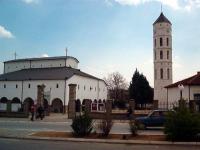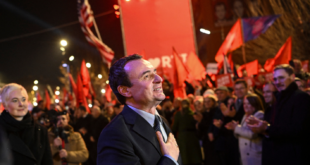 Serbia’s Ministry of Labour and Welfare intends to relocate 62 Roma families, that are currently living in an illegal settlement under the Gazela bridge in Belgrade, to the southern Serbian town of Vranje – despite protests from Vranje’s local authorities.
Serbia’s Ministry of Labour and Welfare intends to relocate 62 Roma families, that are currently living in an illegal settlement under the Gazela bridge in Belgrade, to the southern Serbian town of Vranje – despite protests from Vranje’s local authorities.
The notice from the Ministry to Vranje’s major – which Balkan Insight had an opportunity to see – says that the “displacement of these families is a priority” and that “it must be carried out in accordance with the policy of forced eviction” put forward by the European Investment Bank and European Bank for Development and Reconstruction, who have issued a loan for the reconstruction of the Gazela bridge.
“The local authorities do not agree with this order from the ministry, despite us being under a terrible pressure to do so,” Branimir Stojancic, the local minister for welfare policy in Vranje, told Balkan Insight.
“We are asked to organize the transport of Roma people to Vranje by ourselves, but the Ministry is not interested where these people would live and from what,” he added.
Stojancic says the decision is discrimination by people living in the capital, and that the relocation will endanger the Roma’s basic human right of being able to choose their own place to live.
“The place of residence of these Roma is Vranje, but they have the right to choose themselves where they would want to live. They came to Belgrade a long time ago, hoping they would be able to provide (a better life) for themselves there,” said Stojancic.
The ministry has established that out of 175 families living under the bridge, 113 of them meet the requirement of resuming their life in a different place Belgrade. The notice form the ministry issued to Vranje’s authorities, says the remaining families cannot stay, as this would “inspire further migration to Belgrade and exert unacceptable pressure on the city’s welfare and residential policy”.
But Stojancic claims that the ministry has no plan to aid the local authorities who are supposed to welcome the displaced families.
“The town of Vranje has an annual welfare budget in the amount of 800,000 euros out of a total budget of 18 million euros and of all the users of welfare over 70 per cent are Roma. We simply cannot put up these 62 families,” says Stojancic.
Mile Bajramovic, chairman of the Civil Association Romalen says this is a classic case of discrimination against Roma.
“The ministry’s decision perverts its basic role of taking care of welfare and labour. What would those people live from if they return to Vranje,” he said.
“They are being thrown out of Belgrade although Roma are cleaning the very same Belgrade. I am afraid that someone would make a decision to expel us from Serbia too,” says Bajramovic.
The Roma in Serbia, around 150,000 of them, received the status of an ethnic minority in 2002. Most observers consider that the Roma are economically and socially the most vulnerable ethnic group in Serbia.
The population of Vranje, 350 kilometres south of Belgrade near the border with Kosovo and Macedonia, is 88.000, ten per cent of which are Roma. South Serbia is considered to be an impoverished region, with economic parameters below the republic’s average.
“The ministry wants to bring us new welfare cases which we cannot take care of. If they insist on carrying out this policy, why don’t they issue an order that all our scientists, professors, businessman and other citizens of Vranje who live in Belgrade return to Vranje as well,” said Stojancic.
Contacted by Balkan Insight, the Ministry of Labour and Welfare said the project is only in its initial phase and that meetings on the issue with representatives of local authorities have yet to begin.
 Eurasia Press & News
Eurasia Press & News



